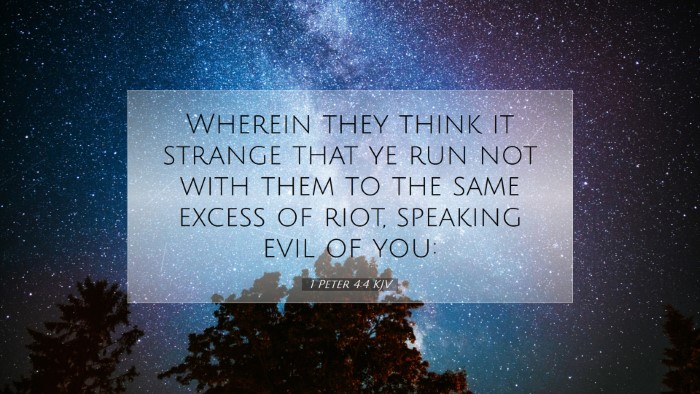Old Testament
Genesis Exodus Leviticus Numbers Deuteronomy Joshua Judges Ruth 1 Samuel 2 Samuel 1 Kings 2 Kings 1 Chronicles 2 Chronicles Ezra Nehemiah Esther Job Psalms Proverbs Ecclesiastes Song of Solomon Isaiah Jeremiah Lamentations Ezekiel Daniel Hosea Joel Amos Obadiah Jonah Micah Nahum Habakkuk Zephaniah Haggai Zechariah Malachi1 Peter 4:4
1 Peter 4:4 KJV
Wherein they think it strange that ye run not with them to the same excess of riot, speaking evil of you:
1 Peter 4:4 Bible Commentary
Commentary on 1 Peter 4:4
Bible Verse: “Wherein they think it strange that ye run not with them to the same excess of riot, speaking evil of you.”
Contextual Understanding
The Apostle Peter addresses the early Christians in a time of persecution and moral confusion. His guidance emphasizes the necessity of a distinct Christian lifestyle, contrasting sharply with the surrounding culture. This verse arrives at a critical junction, detailing the challenges believers face when they choose to abstain from societal norms that are antithetical to their faith.
Insights from Matthew Henry
Matthew Henry reminds us that the unbelieving community views the Christians' refusal to partake in their indulgent behaviors as a rejection of their way of life. He elucidates that this reaction is rooted in their astonishment and perhaps their unacknowledged guilt regarding their own excesses. Henry suggests that rather than succumbing to their judgment, believers must remain steadfast in their faith and witness.
- Surprised by Transformation: The change in lifestyle stands out to those still ensnared in worldly pleasures, framing believers as peculiar in the eyes of society.
- Call to Integrity: Christians are called to maintain integrity despite the scorn they may face, reinforcing the principle that faithfulness often invites scrutiny.
Reflections from Albert Barnes
Barnes focuses on the societal implications of the verse, highlighting that the term "excess of riot" conveys a meaningful intensity of debauchery and indulgence. He points out how these excesses are not only harmful to the individuals partaking but also reflect a moral decay within the community. Furthermore, he elaborates on the fact that persecution often arises from a place of jealousy and misunderstanding.
- Social Discomfort: Barnes notes that while the early Christians chose a path of righteousness, their former peers reacted adversely due to a disturbance in their moral comfort.
- Understanding Persecution: Understanding the root of hostility—often embedded in jealousy—fuels the believer's resilience amid opposition.
Adam Clarke's Analysis
Clarke emphasizes the psychological dimension of this verse, noting how the judgment from others can weigh heavily on a believer. He points out the tendency for those indulging in sinful practices to lash out against those who choose differently as a defense mechanism against their own convictions. Clarke asserts that the mocking of Christians serves to alleviate the discomfort of guilt among the non-believers.
- Difficulties of Isolation: Clarke reaffirms the emotional struggles faced by believers when they experience isolation from their peers due to their convictions.
- Encouragement to Persevere: He encourages believers to remember their identity and purpose in Christ, which should sustain them through mockery and scorn.
Theological Implications
This verse speaks volumes about the cost of discipleship. Through the lens of these commentators, we see a multifaceted view of suffering for the Gospel. The believer's choice to abstain from sinful practices positions them as targets for ridicule, yet it is a vital aspect of living out one's faith. The theological implications extend beyond mere avoidance of sin, revealing insights into the transformative power of Christ in the believer's life.
Practical Application
For pastors, students, and theologians, this verse serves as a reminder to cultivate an understanding of the challenges faced by their congregations and communities:
- Engagement with Culture: Encourage church members to engage with the world around them in a way that reflects Christ while maintaining their values.
- Support for One Another: Provide arenas for believers to share their struggles and experiences of ridicule, fostering a community of support.
- Teaching on Perseverance: Preach on the importance of standing firm in one's faith, especially amid adversity from those who may not understand their choices.


